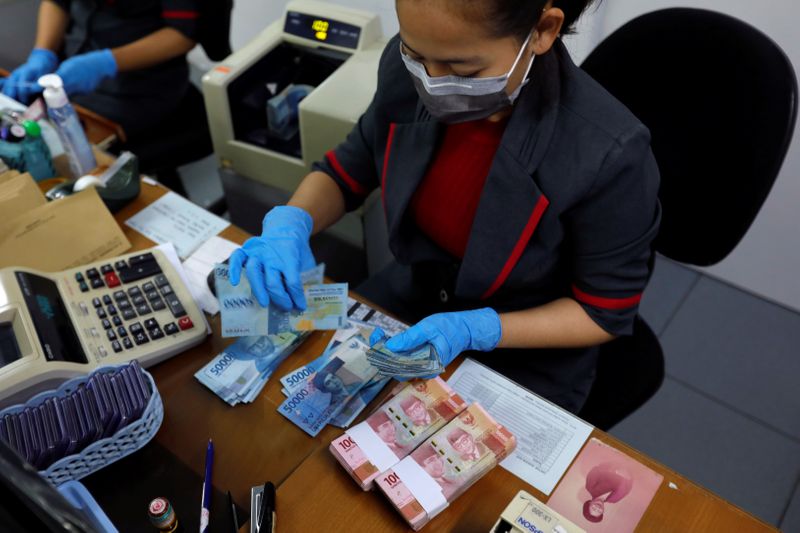By Tabita Diela and Gayatri Suroyo
JAKARTA (Reuters) - A plunge in the rupiah could leave Indonesian firms exposed to $4 billion in debt next year, after credit ratings agencies hit some companies this week with another round of credit downgrades as the coronavirus pandemic chokes economic activity.
Indonesia's increase in private sector debt has outstripped the global average, according to the World Bank, while French bank Natixis sees Southeast Asia's largest economy as among the most exposed to a dollar credit crunch in the Asia Pacific.
Outstanding foreign private debt was $203 billion as of January, according to Bank Indonesia (BI) data.
Fitch Ratings has put Indonesian homebuilders Lippo Karawaci (JK:LPKR) on a negative outlook for its B- rating amid "unprecedented weakening in domestic demand" as the coronavirus outbreak hits economic growth.
Moody's Investor Services has downgraded property firm Alam Sutera Realty (JK:ASRI), Agung Podomoro Land (JK:APLN) and tyre-maker Gajah Tunggal (JK:GJTL) due to the rupiah's fall.
The rupiah
The virus pandemic and rupiah slide weakened the balance sheets of Indonesian companies, said Moody's analyst Jacintha Poh, adding that "this is credit negative for many companies."
Investors in Indonesian corporate bonds usually hold to maturity as the market isn't liquid.
Poh said by telephone that large amounts of Indonesian debt will mature next year, while companies are also exposed now through interest payments.
Indonesia's central bank has since 2015 made it mandatory for companies to hedge a portion of their short-term foreign exchange liabilities.
Governor Perry Warjiyo said debtors have begun asking banks for deferral in interest payments.
The government has alloted 150 trillion rupiah ($9.12 billion) in the budget to help companies that need restructuring as GDP growth is projected to slow to 2.3% in 2020 from 5% last year.
Coronavirus cases in Indonesia have risen to more than 1,700 and the respiratory disease has claimed 170 lives.
MATURITY WALL
S&P Global Ratings' director Xavier Jean told Reuters the rupiah's drop has hurt investor sentiment towards high-risk issuers.
This complicates refinancing needs with a debt maturity wall of $4.5-$5 billion coming in 2021 to 2023, for companies in real estate, commodities, power and the communication, media and techonology sectors, Jean said.
Fitch said companies in property, energy, metals and mining, airlines, and auto- and leisure-related sectors will all face growing debt risks.
Moody's Poh is most concerned about property firms because they borrow in U.S. dollars, but generate income in rupiah and cannot launch sales when people are told to stay home.
Poh cited Alam Sutera, Modernland Realty (JK:MDLN), Gajah Tunggal and investment firm MNC Investama (JK:BHIT) as the most affected.
A Modernland spokesman said the company had mitigated currency risks through hedging. The other companies did not respond to a request for comment.
Still, S&P's Jean said the bond markets were "all but closed" to weaker Indonesian companies.

"So unless they have diversified their funding sources over the years, which few have done, refinancing risk and the likelihood of failed repayment will only go up until debt capital markets normalise," said Jean.